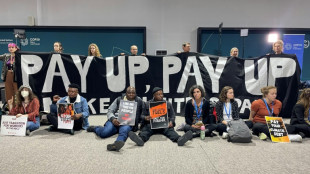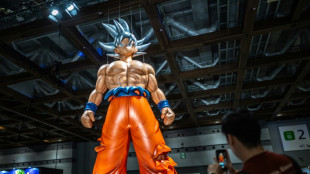
-
 UN nuclear chief welcomes Iran's 'concrete step' on uranium stockpile
UN nuclear chief welcomes Iran's 'concrete step' on uranium stockpile
-
Floods to shave 0.2 percentage points off Spain's growth

-
 Argentina's Contepomi makes one change for France Test
Argentina's Contepomi makes one change for France Test
-
'Steep climb' ahead as clock ticks on stalled climate talks

-
 Gatland changes four for Wales clash with South Africa
Gatland changes four for Wales clash with South Africa
-
'Sport will have the last word' as WRC title goes down to the wire in Japan

-
 Western powers move to censure Iran at UN nuclear meet
Western powers move to censure Iran at UN nuclear meet
-
US envoy presses Israel-Hezbollah truce bid in Lebanon visit

-
 'No controversy' around Alldritt exclusion for Argentina Test
'No controversy' around Alldritt exclusion for Argentina Test
-
Stock markets gain, dollar higher before Nvidia earnings

-
 New WHO financing mechanism put to the test
New WHO financing mechanism put to the test
-
Besigye kidnapping: Uganda president's doctor turned rival

-
 Star K-pop producer of NewJeans quits after legal spat with BTS agency
Star K-pop producer of NewJeans quits after legal spat with BTS agency
-
'Eternal' Nadal leaves legacy as he retires from tennis

-
 Vieira takes over at struggling Gerona
Vieira takes over at struggling Gerona
-
Australia's Kerevi banned for Morgan tackle

-
 Bellamy defies 'lunatic' reputation to inspire Wales revival
Bellamy defies 'lunatic' reputation to inspire Wales revival
-
Kremlin says US 'doing everything' to prolong 'war' in Ukraine

-
 Magritte painting nets auction record of $121 million
Magritte painting nets auction record of $121 million
-
Markets fluctuate as traders weigh geopolitical tensions

-
 N. Korea's latest weapon? Bombarding South with noise
N. Korea's latest weapon? Bombarding South with noise
-
'Kidnapped' Uganda opposition figure Besigye to appear at military court: lawyer

-
 Asian markets fluctuate as traders weigh geopolitical tensions
Asian markets fluctuate as traders weigh geopolitical tensions
-
'An inauspicious day': the landmines ruining Myanmar lives

-
 UN to vote again on Gaza ceasefire, US plans unclear
UN to vote again on Gaza ceasefire, US plans unclear
-
Japan's manga powerhouse 'Dragon Ball' turns 40

-
 Japanese, Koreans bottom of global love life survey
Japanese, Koreans bottom of global love life survey
-
Son blames 'mistakes' after South Korea held by Palestine in qualifier

-
 Japan ramps up tech ambitions with $65 bn for AI, chips
Japan ramps up tech ambitions with $65 bn for AI, chips
-
Lights, action, melodrama! Silent films get new reel at London haven

-
 Myanmar led world in landmine victims in 2023: monitor
Myanmar led world in landmine victims in 2023: monitor
-
ICC to sentence Timbuktu war criminal

-
 Ugandan opposition figure Besigye 'kidnapped', says wife
Ugandan opposition figure Besigye 'kidnapped', says wife
-
Australia's Jason Day eyes more major glory after resurgence

-
 Machu Picchu security boosted after visitors spread human ashes
Machu Picchu security boosted after visitors spread human ashes
-
Popovic hails Australia character in 'crazy' World Cup qualifier

-
 Taliban govt clearing 'un-Islamic' books from Afghanistan shelves
Taliban govt clearing 'un-Islamic' books from Afghanistan shelves
-
Argentina beat Peru as Uruguay hold Brazil

-
 Asian markets struggle as traders weigh geopolitical tensions
Asian markets struggle as traders weigh geopolitical tensions
-
Tatum stars as Celtics end Cavaliers unbeaten start

-
 Hurting India under pressure in blockbuster five-Test Australia series
Hurting India under pressure in blockbuster five-Test Australia series
-
'They killed her dream': Israel strike leaves woman footballer in coma

-
 Iraq holds its first census in nearly 40 years
Iraq holds its first census in nearly 40 years
-
Iraqis face tough homecoming a decade after IS rampage

-
 Russian net tightens around last civilians left in eastern Ukraine
Russian net tightens around last civilians left in eastern Ukraine
-
Olympic champion Tebogo aims to inspire next generation of African athletes

-
 Valencia on target as ten-man Ecuador upset Colombia
Valencia on target as ten-man Ecuador upset Colombia
-
'Rust' to premiere three years after on-set shooting

-
 Strike at French cognac maker Hennessy over measures in China spat
Strike at French cognac maker Hennessy over measures in China spat
-
Xi, Lula meet in Brasilia to 'enhance ties'


EU embargo on Russian oil, gas will take 'months'
The EU is working on broadening sanctions on Russia to include oil and gas embargoes but such measures would take "several months", European officials told AFP on Friday.
The bloc last week announced a ban on Russian coal in a first step against Russian energy exports -- together, Moscow's main hard currency earner.
But the coal sanction only kicks in from mid-August, and would hit around eight billion euros ($8.7 billion) in Russia's sales abroad, annually.
Russian oil and gas sales to the EU account for a far higher amount of revenue: between a quarter of a billion to a billion euros per day, per different estimates.
Public and political opinion in the EU is swinging towards a total energy ban as Moscow's war in Ukraine grinds on and yields discoveries of atrocities.
An EU official involved in discussions on cutting Russian energy imports said the European Commission is "thinking about options". Commission chief Ursula von der Leyen has already come out publicly in favour of targeting Russian oil.
But, the official said, "adopting measures on oil means undoing existing contracts, finding alternatives and preventing circumvention".
"That can't be don't overnight. It requires at least several months."
- Outrage over war -
Building EU outrage over the war is sweeping aside hesitation by the member states reliant on Russian oil and gas, such as the bloc's biggest economy Germany, and Italy, Greece and Austria.
Some EU countries, such as Lithuania, have already announced national bans on Russian oil and gas.
One option to quickly stall revenues going to Russia's war could be to pay for energy imports through an escrow account, which Moscow wouldn't be able to touch until a postwar settlement.
But there is also thinking about how Russia might retaliate, by cutting supplies to Europe, or -- as President Vladimir Putin said this week -- selling more to Asia.
In any case, it's clear that European industry and consumers will have to consume less oil and gas -- something economists call "demand destruction".
"Cutting demand will have an impact with price hikes," another EU official said, echoing comments from several ministers in the bloc.
They noted that the EU's main ally in the sanctions, the US -- which a month ago imposed its own ban on Russia's energy imports -- is leery of petrol price rises for American drivers.
"What's more, if Russia sells oil snubbed by the Europeans to other buyers, the sanctions won't work," one EU official said.
The Europeans and Americans are looking to avoid the sanctions being weakened by China and India.
Brussels is telling Beijing and New Delhi the EU would find it "difficult to accept partners who undermine the sanctions," one EU diplomat said.
- EU unity -
At the same time, the EU is intent on preserving unity among its 27 member states as it navigates sensitive national interests on energy.
Yet determination to target Russian energy was evident at the last meeting of EU foreign ministers on Monday in Luxembourg.
"The European Union is spending hundreds of millions of euros on importing oil from Russia -- that is certainly contributing to financing this war," Irish Foreign Minister Simon Coveney said at that meeting.
"In our view, we need to cut off that financing of war, even though it creates huge challenges and problems for the EU to solve together."
EU foreign policy chief Josep Borrell said after the meeting that "nothing is off the table, including sanctions on oil and gas" but no decision was yet made.
Borrell said that, in 2021, the EU paid Russia $80 billion (74 billion euros) for oil and $20 billion for gas -- which would work out as an average of 250 million euros per day.
Other European sources, including MEPs, have spoken of Russian fossil fuel imports to the value of up to 700 million euros per day.
Figures vary depending on what period of time is being looked at, contract prices versus market spot prices, and currency valuations.
A spike in energy demand as Covid-19 restrictions were eased made energy prices jump even before the war in Ukraine.
The International Energy Agency said that, in 2021, the EU imported 155 billion cubic metres of gas from Russia, representing 45 percent of its gas imports.
The World Economic Forum says the EU gets over a quarter of its imported crude from Russia, but volumes have been dropping over the past decade.
D.Johnson--AT
